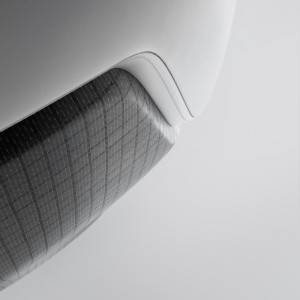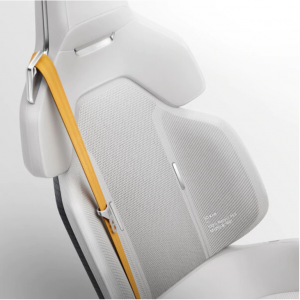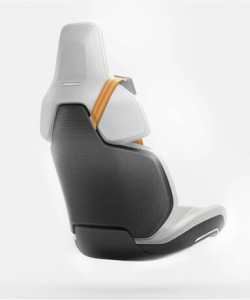 Polestar identifies next steps towards reducing carbon footprint with innovative interior materials for future production models
Polestar identifies next steps towards reducing carbon footprint with innovative interior materials for future production models- Responsible use of materials includes 3D-knit fabric for seats utilising 100% recycled PET bottles, interior plastics infused with waste cork products and carpets derived from recycled fishing nets
Following in the footsteps of the vegan interior featured as standard in the Polestar 2, Polestar identifies its next steps towards full-circle sustainability for its vehicles. Working with specialists in the field, the contemporary electric performance brand is aiming to reduce weight, cut plastic content and lessen waste material with innovative natural and recycled source materials.
“It’s clear that to be truly sustainable we have to evaluate every element that goes into our cars,” says Thomas Ingenlath, Polestar CEO. “For Polestar, sustainability is not just about the electric powertrain. With the development of these innovative new solutions that we will introduce in our future cars we make a strong statement of our intentions.”
Bcomp’s revolutionary powerRibsTM and ampliTexTM technologies could turn natural fibres into lightweight and safety-conscious interior panels for future production models within the Polestar range. The composite utilises flax, which differs from many bio-materials as it is both ideal for use in crop rotation programmes and does not directly compete with food crops.
With up to 50% reduction in overall weight and an 80% reduction in plastic content compared to traditional interior panels, Bcomp enables a significant weight saving by being not only stronger but also lighter than traditional plastics used in car interiors.
 A 3D-knit material, well-known in the fashion and active footwear industries, can be implemented as seating surfaces to reduce waste and promote recycled material sources. A single thread is used to produce a three-dimensional individual component in its entirety and the base material is 100% recycled yarn derived from PET bottles. Waste is removed in the production process since the material is made exactly to size with no off-cuts.
A 3D-knit material, well-known in the fashion and active footwear industries, can be implemented as seating surfaces to reduce waste and promote recycled material sources. A single thread is used to produce a three-dimensional individual component in its entirety and the base material is 100% recycled yarn derived from PET bottles. Waste is removed in the production process since the material is made exactly to size with no off-cuts.
The wine and fishing industries can also contribute towards Polestar’s quest for full-circle sustainability, with cork and fishing nets being recycled and incorporated within car interiors. Waste material from the cork manufacturing process and even whole bottle stoppers can be integrated into PVC interior componentry. Recycled Nylon 6, derived from discarded fishing nets, can be turned into woven carpets and is gathered through an international collection network to infinitely regenerate this material and accept returned end-of-life products from customers and consumers.
 “Importantly, we don’t need to sacrifice design and luxury with these materials,” says Maximilian Missoni, head of Design at Polestar. “If anything, they enable an even more premium, cutting-edge execution which elevates our design-led products. Using sustainable materials presents a positive challenge, giving new meaning to interior design. We are able to derive entirely new aesthetics from a new context and the related technologies, allowing society to move on.”
“Importantly, we don’t need to sacrifice design and luxury with these materials,” says Maximilian Missoni, head of Design at Polestar. “If anything, they enable an even more premium, cutting-edge execution which elevates our design-led products. Using sustainable materials presents a positive challenge, giving new meaning to interior design. We are able to derive entirely new aesthetics from a new context and the related technologies, allowing society to move on.”
These advances in interior technology build on the brand’s sustainability message already highlighted by the standard vegan interior in Polestar 2. They also reinforce the brand’s commitment to meaningful sustainability in all that it does, including the expected Gold LEED-rated Chengdu manufacturing plant.
About Polestar
Polestar is the electric performance car brand jointly owned by Volvo Car Group and Zhejiang Geely Holding. Polestar enjoys specific technological and engineering synergies with Volvo Cars and benefits from significant economies of scale as a result. This facilitates the successful design, development and production of separately-branded, electric performance cars.
Polestar launched in 2017 with the Polestar 1 – a low-volume Electric Performance Hybrid GT with 609 hp, 1,000 Nm and an electric-only range of 124 km (WLTP) – the longest of any hybrid car in the world. In 2019, the Polestar 2 was revealed as the company’s first full electric, higher volume premium car. In the future, Polestar 3 will join the portfolio as a fully electric performance SUV.
Source
Polestar, press release, 2020-02-11.
Supplier
Share
Renewable Carbon News – Daily Newsletter
Subscribe to our daily email newsletter – the world's leading newsletter on renewable materials and chemicals










